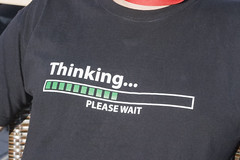It’s the second edition of Thinky Links! Wherein I share a bunch of articles and features that have made me think lately.
I don’t think I’ve mentioned this here before, but I have a problem with the usual, chapter-a-week critique group format. I’ve taken chapters through that format, and while the chapters themselves get better, it’s like putting lipstick on a three-legged pig. The thing needs a prosthetic, not make up. Kristin Lamb has a new approach to the traditional critique group with a Concept critique. (I love the idea, but shudder at the thought of writing out 75 pages of outlines before I begin.) This inspired my fledgling critique group to totally change up our format—and so far, it works! Now if only we could get our schedules to do the same.
I’ve mentioned a couple of Vince Mooney’s points on book marketing, but he also has some fun lists on his blog, including more than 100 nonverbal cues, 200 triggers for creating emotional responses, 100 ways a character might grow in the course of a romance and how to show it and more. While every one of these suggestions obviously won’t work for every character, hopefully there will be something to jog your imagination and personalize your character.
Want to inject more humor into your writing? Author Julie Lessman posts at Seekerville about the whys and hows of humor even in non-comedic novels.
Every week, author Julie Coulter Bellon offers a free first page critique from an anonymous national editor. Interested? Here are the guidelines:
Want your first page critiqued by a national editor? Submit your double-spaced, 12 point font, first manuscript page to juliecoulterbellon@gmail.com with First Page Friday in the subject line. Ms. Shreditor and Angela Eschler critique every Friday. (Please no swearing or explicit sex scenes).
In February, author Kathi Oram Peterson devoted the month to writing about faith—specifically, having faith in yourself and your writing. If your faith is flagging, check out her posts!
Every time I go to author Jody Hedlund’s blog, I read pretty much everything I get my hands on. Most recently, I really liked her articles on time management for busy writers (from a home-schooling mom of 5 and published author!), how to make more time for blogging (and writing), living intentionally but with breathing space (on time management and meeting goals). Apparently my subconscious is worried about something. . . .
Which of these links makes you think? What other great articles have you read lately?

